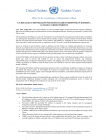Click to expand Image
Dominic Ongwen at his confirmation of charges hearing in ICC courtroom I on 21 January 2016
© ICC-CPI.
The International Criminal Court (ICC) today imposed a 25-year-sentence on Dominic Ongwen, a former leader of the Lord’s Resistance Army (LRA). The sentence marks an important milestone in the search for justice for victims of the grave international crimes committed by this notorious armed group in northern Uganda.
At the sentencing hearing, the court explained that it weighed a number of considerations, including the breadth and gravity of the crimes and Ongwen’s culpability, but also the fact he was abducted as a child, forced to join the LRA, and lost any opportunity to become a “valuable member of his community.” Ongwen – the first LRA leader to be held accountable – had been found guilty of 61 war crimes and crimes against humanity that included hundreds killed, child victims, and sexual violence.
The personal circumstances Ongwen faced led the court to reject a life sentence even though other aspects of the case would have made such a sentence appropriate. One judge dissented, arguing for a higher sentence of 30 years in prison.
The court made several other important determinations in the case, rejecting defense arguments that duress or diminished mental capacity were mitigating factors.
The court also rejected applying Ugandan traditional reconciliation measures in lieu of imprisonment as sought by the defense. The court stated the ICC would not have authority under its Rome Statute to impose such a sentence, but also that the victim participants in the trial clearly conveyed they opposed such an approach.
The next phase in this case will be hearings on reparations for victims of the crimes, an important aspect of the ICC’s role in bringing redress.
Today’s sentencing should not obscure a gaping hole in accountability for LRA crimes. Joseph Kony – the LRA’s founding leader and only remaining living ICC suspect for LRA crimes – remains a fugitive. Kony has been operating in a disputed border area of Sudan and South Sudan as of mid-2020. The ICC – without its own police force – cannot ensure his apprehension. On behalf of the victims, governments in the region and beyond should recommit to working together, along with United Nations peacekeeping missions, to see that he too faces justice at last.



